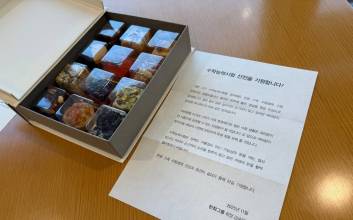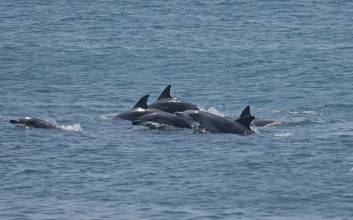◆이코노미스트가 글로벌 차세대 경제 리더, 청소년 기자단 영 저널리스트와 함께합니다. 영 저널리스트 기자단은 프리미엄 경제지 이코노미스트, 논술 전문 기관 Ni 에듀케이션과 함께 주요 시사 이슈를 팔로우업하고 직접 기획, 취재, 기사 작성 활동을 하며 사회적 문제를 고심하고 해결 방안을 제시하는 과정을 경험하게 됩니다. 이번 기사는 영 저널리스트 기자단이 현 사회현상에 대해 학생들 시선에서 ‘왜’라는 질문을 갖고 직접 취재해 작성한 기획기사입니다. 영 저널리스트 기자단의 기획기사는 영문과 국문, 두 형태로 게재합니다.
In November 2023, off the coast of Gujwa-eup in Jeju, a young Indo-Pacific bottlenose dolphin was found entangled in fishing lines around its mouth and tail. Named “Jongdali” after the area where it was discovered, the dolphin could not be rescued despite multiple attempts. The emergency rescue team once succeeded in cutting off the long fishing line trailing from Jongdali’s tail, but they could not remove the hook caught in its mouth or the line tightly wrapped around its tail fin. As time passed, the line cut deeper into the dolphin’s body, and rescue efforts repeatedly failed. After living in pain for over a year, Jongdali disappeared around May 2024 and is now presumed dead.Who is responsible for Jongdali’s death? If the dolphin could hold someone accountable, who would be the offender—and what punishment would they face?Jongdali’s death from fishing-line entanglement… What if it had legal rights?In December 2024, a new bill was proposed to protect the Indo-Pacific bottlenose dolphin, considered the symbol of Jeju’s seas. The “Jeju Special Act” representatively proposed by Representative Wi Seong-gon of the Democratic Party to the National Assembly, seeks to legally recognize these internationally endangered dolphins as entities with rights and responsibilities. This would be Korea’s first attempt to legally establish an organization dedicated to managing endangered marine mammals. Experts view this as a turning point—not merely for animal protection, but for the preservation of the marine ecosystem itself. A recent string of dolphin deaths off Jeju’s coast highlights the urgent need for such legislation.Currently, the Jeju Indo-Pacific bottlenose dolphin is the only dolphin group that permanently inhabits Korean waters, with an estimated population of just about 120 individuals. Though designated as both a Class I Endangered Species and a Protected Marine Species, they continue to face threats such as marine debris, ship collisions, and illegal capture.The Ecological Corporation Bill, proposed last year, aims to create a institutional system to address these issues. Just as corporations are given legal personhood, this bill would grant legal status to ecologically valuable natural environments and species, allowing them to be legally protected. Once designated as an “ecological corporation,” animals and plants would gain legal rights, including: the right to demand habitat and ecosystem preservation, the right to seek remedies for environmental harm, the right to request restoration and conservation actions, and the right to restrict development in protected areas. Other countries have already implemented similar policies such as orangutans or turtlesWhile Korea has yet to officially recognize an ecological corporation, similar systems have been successfully implemented abroad.In 2014, an Argentine court recognized Sandra, an orangutan kept in a zoo, as a “non-human person” with basic rights. Similarly, New Zealand’s Whanganui River, Spain’s Mar Menor Lagoon, and Panama’s sea turtles have all been granted legal personhood.
Despite its ecological and moral importance, there is opposition to the system. According to director Kang Seung-oh, an official in Jeju Special Self-Governing Province Maritime Industry Division, most of the opposition comes from fishermen, who fear that designating dolphins as an ecological corporation would restrict fishing activities.However, Kang explained that such concerns are largely unfounded:“The bill does not restrict fishing itself,” he said. “If any economic loss occurs as a result of ecological corporation designation, the bill provides for compensation We plan to continue open dialogue to gain understanding from local fishermen.”Others question the legal basis for granting personhood to animals. They argue, “How can a non-human organism be given legal status?”
In response, Jin Hee-jong, president of the Jeju Institute for Lifelong Education and Scholarship and a leading advocate for the initiative, stated:“The ecological corporation system represents a paradigm shift—from a relationship of domination and exploitation between humans and nature to one of care and coexistence. Breaking away from a human-centered worldview is not easy, but it is necessary.”He continued: “The decline of dolphins is not just the loss of one species—it is a warning that the entire marine ecosystem of Jeju is collapsing. Now is the time to grant dolphins legal status to help restore Jeju’s marine balance.”A crucial moment for Jeju’s marine futureThe amendment bill, which includes the ecological corporation system, is currently under review by the National Assembly’s Public Administration and Security Committee. If passed, an ecological corporation will be established in Jeju and corresponding budget allocated.Supporters expect that this will not only help recover the dolphin population, but also build a sustainable marine ecosystem and strengthen Jeju’s tourism resources. However, social consensus and stable financial support remain major challenges.The protection of the Jeju Indo-Pacific bottlenose dolphin is not merely an issue of animal welfare. It is a question of marine ecosystem health, community sustainability, and what kind of ocean we will pass on to future generations.If Jongdali had been under the protection of an ecological corporation, perhaps we could still see it swimming freely in the waters off Jeju today. Now is the time for law and society to work together—so that tragedies like Jongdali’s are never repeated.
![아침 3도, 낮엔 22도…“경량 패딩으로 온도차 잡기”[AI 날씨 코디]](https://image.economist.co.kr/data/ecn/image/2025/11/05/ecn20251105000068.353x220.0.png)





















![“우리 아이 무시해주세요”… 아들맘 필수 구독 채널 ‘소히조이’ [김지혜의 ★튜브]](https://image.isplus.com/data/isp/image/2025/11/02/isp20251102000029.400.0.jpg)
![도로 위의 크리에이터, ‘배달배’가 만든 K-배달 서사 [김지혜의 ★튜브]](https://image.isplus.com/data/isp/image/2025/09/25/isp20250925000152.400.0.jpg)


